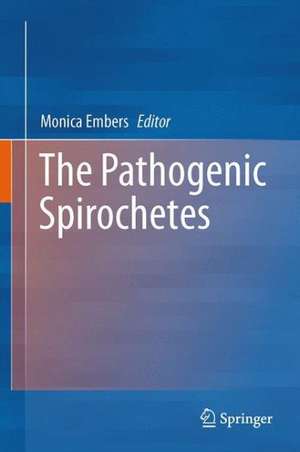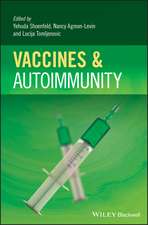The Pathogenic Spirochetes: strategies for evasion of host immunity and persistence
Editat de Monica E. Embersen Limba Engleză Hardback – 7 dec 2012
| Toate formatele și edițiile | Preț | Express |
|---|---|---|
| Paperback (1) | 1093.52 lei 6-8 săpt. | |
| Springer Us – 28 ian 2015 | 1093.52 lei 6-8 săpt. | |
| Hardback (1) | 1100.30 lei 6-8 săpt. | |
| Springer Us – 7 dec 2012 | 1100.30 lei 6-8 săpt. |
Preț: 1100.30 lei
Preț vechi: 1158.20 lei
-5% Nou
Puncte Express: 1650
Preț estimativ în valută:
210.54€ • 219.39$ • 174.33£
210.54€ • 219.39$ • 174.33£
Carte tipărită la comandă
Livrare economică 03-17 aprilie
Preluare comenzi: 021 569.72.76
Specificații
ISBN-13: 9781461454038
ISBN-10: 1461454034
Pagini: 284
Ilustrații: XVI, 268 p.
Dimensiuni: 155 x 235 x 21 mm
Greutate: 0.57 kg
Ediția:2012
Editura: Springer Us
Colecția Springer
Locul publicării:New York, NY, United States
ISBN-10: 1461454034
Pagini: 284
Ilustrații: XVI, 268 p.
Dimensiuni: 155 x 235 x 21 mm
Greutate: 0.57 kg
Ediția:2012
Editura: Springer Us
Colecția Springer
Locul publicării:New York, NY, United States
Public țintă
ResearchCuprins
Treponema pallidum.- Immunoseclusion and Chronic Infection.- Treponema Denticola.- Borrelial Complement-binding Proteins.- Treponema Pallidum Repeat (tpr) Genes and Antigenic Variation.- Antigenic Variation of V1sE by Borrelia Burgdorferi.- Modulation of Cytokine Signaling by Borrelia Burgdorferi.- Leptospira: Invasion, Pathogenesis and Persistence.- Immune Resistance by Relapsing Fever Spirochetes.- Neuroborreliosis Caused by Borrelia Burgdorferi: Possible Role of Glial Cells.- Antibiotic Resistance in Treponema Pallidum subsp. Pallidum, the Syphilis Agent.- Borrelia Burgdorferi Persistence Post-Antibiotic Treatment.
Textul de pe ultima copertă
This book explores the many mechanisms by which the most prevalent Spirochetal pathogens persist in a healthy immune-competent host. Among them are the direct and indirect suppression of host immune signals, phase and antigenic variation, escaping recognition by host complement proteins, and seclusion into immune privileged sites. It also explores antibiotic therapy for control of infection, a baffling topic that lends itself to exalted interpretation.
Caracteristici
This book explores the many mechanisms by which the most prevalent Spirochetal pathogens persist in a healthy immune-competent host Among them are the direct and indirect suppression of host immune signals, phase and antigenic variation, escaping recognition by host complement proteins, and seclusion into immune privileged sites Addresses antibiotic therapy for control of infection, a baffling topic that lends itself to exalted interpretation Includes supplementary material: sn.pub/extras Includes supplementary material: sn.pub/extras










